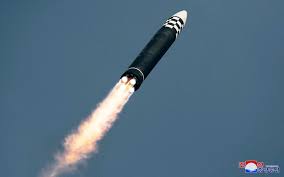As South Korea and the US concluded 12 days of amphibious naval joint military drills, and prepare for the beginning of major combined air drills that will involve more than 200 US and South Korean fighter jets on Monday, North Korea on Friday fired two short-range ballistic missiles, the South Korea’s military detected Friday morning.
North Korea considers the joint U.S/South Korea’s drills provocative and preparations for invasion.
South Korea’s military said it had “detected two ballistic missiles fired from the Tongchon area in Gangwon between 1159 (0259 GMT) and 1218,” referring to a province on North Korea’s east coast.
South Korea’s Joint Chiefs of Staff in a statement declared: “Our military has increased monitoring and surveillance and is maintaining a full readiness posture in close coordination with the US.”
North Korea has this month fired multiple artillery barrages into a maritime “buffer zone” that was set up in 2018 as a way of reducing tensions with the South during a period of ill-fated diplomacy.
It also announced it had staged what it called “tactical nuclear drills” that simulated showering the South with nuke-capable missiles.
And on Monday, a North Korean ship reportedly crossed the two countries’ flashpoint maritime border, prompting an exchange of warning shots.
North Korean state media has also recently carried a rare series of statements from the country’s military condemning the “enemy’s war drills” and calling on them to stop.
There has been rising tensions in the Korean peninsula, as North Korean leader, Kim Jong Un, in September declared that the North is an “irreversible” nuclear power, effectively ending negotiations over his banned weapons programmes.
The U.S. and South Korea have been warning for months that Kim is ready to conduct another nuclear test, which would be the country’s seventh — and the first since 2017.
On Tuesday, South Korean President Yoon Suk-yeol told parliament that it appeared Pyongyang had “already completed preparations for a seventh nuclear test.”
On Wednesday, the United States, Japan and South Korea said that a North Korean nuclear test would warrant an “unprecedentedly strong response”, vowing unity between the regional security allies.
North Korea has conducted its longest-ever missile launch by distance, which overflew Japan.
In response, Seoul has conducted live-fire drills, and the US re-deployed a nuclear-powered aircraft carrier to the region to conduct large-scale trilateral drills also involving Tokyo.

 Health6 days ago
Health6 days ago
 Entertainment1 week ago
Entertainment1 week ago
 Crime7 days ago
Crime7 days ago
 Comments and Issues1 week ago
Comments and Issues1 week ago
 Latest1 week ago
Latest1 week ago
 Football1 week ago
Football1 week ago
 Comments and Issues1 week ago
Comments and Issues1 week ago
 Comments and Issues1 week ago
Comments and Issues1 week ago

